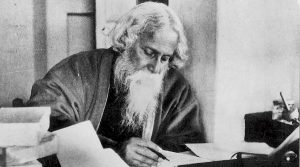
Aguner Poroshmoni, a musical expression of self-surrender, is the customary inaugural song for Rabindrasangeet Sammelan Parishad. In Geetabitan, this is the 212th song under Puja category, the composition of which dates back to 1914. In August, 1914 Rabindranath Tagore came to stay in the village of Surul, near Sriniketan, for agricultural and scientific work. At that time, Dinendranath Tagore, poet’s nephew, resided in a humble hut in Benukunja (Bamboo Grove). It was during this period that Rabindranath composed new songs for Geetabitan, teaching them to Dinendranath every evening. On August 28, during his stay in Surul, Rabindranath composed the song Aguner Poroshmoni Chhoyaao Prane.
In August 1914, the magazine Probasi published 24 songs from the collection Gitali under the title “Geetiguchho”. Aguner Poroshmoni was one of these songs which was the 18th poem of the said collection. In 1915, Tagore came to Kolkata on the occasion of the 85th Maghotsava (winter festival) of Brahmasamaj and on January 25th, around 10 songs were sung during the evening prayer in Maharshi Bhavan, of which Aguner Poroshmoni was 5th in sequence. The song was also published in Tattwabodhini magazine in the Falgun issue of the same year.
In 1916, the song was published in the Ashwin-Kartik issue of the magazine Anand Sangeet. In 1931, the song was included under the title “Poroshmoni” in the poetry collection Sanchayita by Tagore. Amal Mukhopadhyay, Rabindrasangeet scholar, wrote that the song Aguner Poroshmoni is a prayer for enlightenment in the fire of sorrow, for the purification of life, and for life to be sanctified.
Lyrics:
আগুনের পরশমণি ছোঁয়াও প্রাণে।
এ জীবন পুণ্য করো দহন-দানে ॥
আমার এই দেহখানি তুলে ধরো,
তোমার ওই দেবালয়ের প্রদীপ করো–
নিশিদিন আলোক-শিখা জ্বলুক গানে ॥
আঁধারের গায়ে গায়ে পরশ তব
সারা রাত ফোটাক তারা নব নব।
নয়নের দৃষ্টি হতে ঘুচবে কালো,
যেখানে পড়বে সেথায় দেখবে আলো–
ব্যথা মোর উঠবে জ্বলে ঊর্ধ্ব পানে ॥
English translation (Own Translation) :
Enrich my life with the fiery touchstone,
Purify my life with the gift of fire,
Hold my body aloft
Let it be the lamp burning in your sanctum
Let the flame radiate day and night through my songs.
Touching the edges of darkness, may your touch
Help new stars to glimmer through the night
My eyes will be cleared of all darkness
There will be light everywhere I look
All my suffering will be set ablaze and soar towards heaven…
Some useful information:
Written on: August 28, 1914, at Surul
Age of the poet: 53
Published in: Gitali (1916)
Parjaay (Category): Puja (Worship)
Upa-parjaay (Sub-category): Dukkha (Sorrow)
Taal: Dadra
Raga: Gour-Sarang
Notation: Gitalekha 3
Swarabitan: Vol. 53
Notation by: Dinendranath Tagore
Purpose of the presentation:
Tagore’s music resonates with people from all walks of life. His songs are performed at cultural events, religious ceremonies and social gatherings, reflecting their enduring popularity. In an effort to bring home this treasure trove to the non-Bengali population and Bengalis around the globe, Brainware University offers a selection of Rabindrasangeet in this presentation. It is enriched with details on the songs and relevant anecdotes.
Sung By
Sri Phalguni Mookhopadhayay Chancellor, Brainware University Phalguni Mookhopadhayay is the founder-Chancellor of Brainware University, founder-Chairman and Managing-Director of Brainware Consultancy Private Limited and founder-Chairman of Webguru Infosystems Private Limited. He did his schooling at Ramakrishna Mission Vidyalaya, Narendrapur, and graduated with honours in Economics from St Xavier’s College, Kolkata. He completed his masters in Economics from Calcutta University and MBA from IISWBM, before joining Hindustan Lever as a management trainee. He worked as a market planner for the ABP group for nearly a decade before striking out on his own and successfully launching two private limited companies and one University. Phalguni Mookhopadhayay is a self-taught digital artist, a versatile photographer, a filmmaker and a weekend singer who has already recorded 78 songs and is now immersed in a project to popularise Tagore songs among a global audience.





